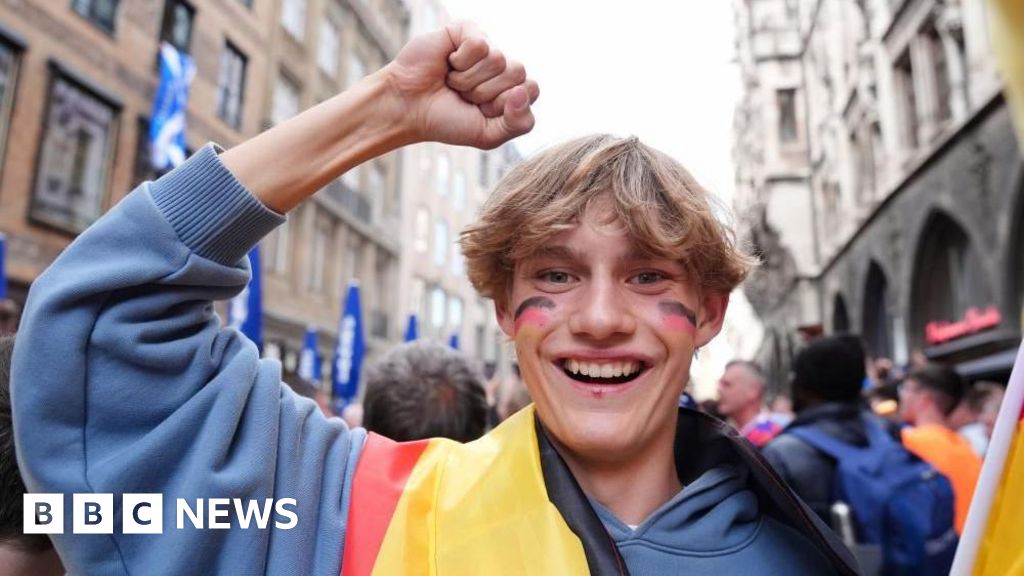Sports
Will Euro 2024 give Germany another summer fairytale? – BBC News

- Author, Nick Beake
- Role, Europe Correspondent
- Reporting from Munich
Outside the town hall in the historic centre of Munich, a stirring rendition of the national anthem strikes up.
It’s a musical display that sparks a crescendo of warm applause among the intrigued Bavarian locals who’ve stopped to appreciate it.
But the solitary musician is not German. He’s Scottish. And his instrument is a bagpipe.
Indeed, you could be hard pushed to find a German entirely happy to perform their own anthem like this. Brash or impromptu displays of tuneful public patriotism aren’t very German.
However, this melodic interlude neatly reflects how visiting football fans are energising and giving a prompt to their hosts who have, so far, seemed somewhat apathetic to the party they’re about to throw this summer.
Researchers have put it down to a combination of eight years without a win in the knockout stages of an international tournament for the men’s team, the high price of tickets and also a wider national malaise.
Germany’s politics are increasingly fragmented and fractious with clashes within the coalition government, and economic growth is sluggish at best.
What the country really needs is another “Sommermärchen” – a summer fairy-tale.
This is the label that was lovingly attributed to the summer of 2006, when Germany hosted the men’s World Cup.
While today most Germans would still raise an eyebrow at an impromptu street performance of their anthem, 2006 was notable in that fans waved flags with carefree joy.
Previously, many had felt deeply uncomfortable displaying national colours – a legacy of the country’s troubled 20th Century.
The home team was knocked out in the semi-final 18 years ago, but not before capturing the public imagination. This, in turn, showcased to the world a united, colourful and more confident country.
Image source, Ullstein Bild/Getty Images
“Everybody hopes for a Sommermärchen 2.0 with the happy mood of 2006 returning in 2024, but I am sceptical,” says leading football journalist Philipp Köster.
He identifies a number of reasons why he feels like this.
“It’s a different situation, we’ve got the war in Ukraine, we just went through the pandemic, society is torn, people don’t know what direction they should take.”
Germany’s ruling three-way coalition, that assumed power in 2021, has passed key legislation, but perpetual bickering has made it unpopular.
At the same time, the far-right anti-immigration AfD has been picking up support and scored an unprecedented success, coming second at last weekend’s European Parliament elections.
“It’ll be interesting to see if this tournament makes people come together, turn into good hosts and maybe find some direction themselves,” says Philipp Köster.
There’s plenty of direction at ESV Freimann football club in the north of Munich.
It comes from the legions of volunteer coaches dispensing vocal encouragement to the many dozens of young players who are training on the impeccably kept grass.
More than 300 children play here every week with 18 teams in all. The women’s side is currently the most successful.
If the appetite for Euro 2024 is wanting among many German adults, the teenagers here buck the trend. They’re revelling in the prospect of being hosts.
“I think it will bring people together because it’s something we share as a community because so many people love football,” says 14-year-old Samuel.
But he doesn’t believe Germany are good enough to win the tournament.
It’s a view shared by his teammate Ryan, although he predicts the impact of a home victory would be massive.
“If the Germans win, then many more people will play the game and that’s a really good thing. But I just can’t believe this is all happening where I live.”
For the national organisers, the safety and security of all the fans is the number one priority.
Euro 2024 takes place at a time of increased international tension, as a result of the ongoing war in Ukraine and the renewed conflict in the Middle East.
Outside police HQ in central Munich, I meet Deputy Commissioner Michael Dibowski.
From his base here, he will command operations around the six matches being held in the city over the next month.
He says his aim is to ensure every fan has as much fun as possible, but his team is preparing for every type of threat one may expect at such a high-profile event.
“During the last weeks we’ve had some postings on social media from the Islamic State,” he says.
“We checked these posts but we don’t expect a concrete danger. It’s possible that someone could be motivated by this post, so we have to be here, present and prepared.”
Germany has seen a number of politically motivated attacks recently.
Earlier this month, a police officer was stabbed to death in Mannheim, in the south-west of the country, as a far-right gathering was taking place.
Image source, Offside/Getty Images
With much of the preparation until now taking place away from the public gaze, it may be understandable to some extent that collective excitement isn’t yet at fever pitch.
And it’s worth remembering that in the run-up to Germany’s golden summer of 2006, there wasn’t much overtly public enthusiasm for the tournament.
But then began the action and the fairy-tale was written.
Veteran journalist Philipp Köster says the potential potency of this game should never be doubted.
“If anything can bring Germany, the people here back together, it is football,” he says.
“The nation’s last big campfire, where people can feel at home irrespective of their political or religious differences.”
Germany doing well is crucial, he considers, but it’s not everything.
“Naturally, we want to be good hosts. When 100,000 Scotsmen, Englishmen, Dutch, Spaniards, Italians turn up here, we don’t want to be the sour-faced Germans. It’s a good opportunity to show Germany’s friendly face.”







:max_bytes(150000):strip_icc()/roundup-writereditor-loved-deals-tout-f5de51f85de145b2b1eb99cdb7b6cb84.jpg)


